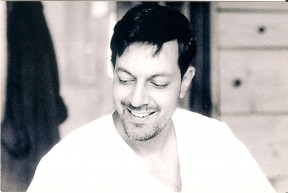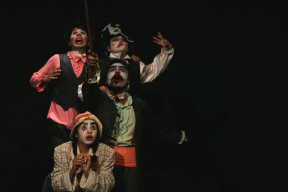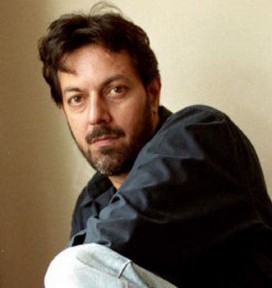Rajat Kapoor is not made for water-tight definitions. So yes, he acts in films and writes them and directs them too but then there is a theatre and the fact he acts on stage and yes, directs too. The one common thread in all pursuits is the need to tweak, deviate, be new, be alive to the possibility of something as yet undiscovered, unspoken, unheard, untested.
Unboxed Writers caught up with him just before his play Hamlet-The Clown Prince opens in Bangalore to decode the process that led a monumental tragedy to become a tragi-comic, ironical, devised piece with clowns interpreting the text.
Said Rajat, “Devised comedy? We didn’t start thinking that it would be a funny play. Sure, it was with clowns, but it could have gone anyway. And it was Hamlet we were dealing with- so there were no givens. The excitement of a devised piece (and that is the only way I want to work now), is exactly that, the fact that you do not know where you are going to land at the end of it all. You work with an instinct and it could be all wrong. But let us not dramatise it either. I think that is the process of making any art. When you start writing a novel, you don’t really know where you are going with it. But when you actually begin to write, it is the novel that writes you. You are just a tool then and if you are smart, you go with the flow. You write how the novel wants you to write it. ”
He adds, “The work makes itself. One brings of course one’s own instinct and understanding of the medium to it to intervene once in a while. Of course your job is more to figure out where this piece is going, and allow it to grow organically in that form. Is one trying to say anything through this interpretation? Hell, no! I mean, I don’t know. Maybe one says something through one’s work- but that must happen without you realising it.”
“If somebody starts by thinking, okay this is what I want to say through my work, then it is in the realm of propaganda. But a work contains in it, a vision, a way of looking, a sharing of experience that is/was our life and a understanding of ourselves and most importantly, I think…joy! That is the purpose of art. Rest is all secondary.”
About working with theatre and cinema, he says, “I love them both. I don’t know which one gives more freedom. Normally the answer to that would be theatre because cinema depends so much on money and distributors and producers and all that jazz. But I have been lucky. And I have been determined to make only those films that allow me complete freedom. So, each film of mine has my signature on it. If there are failures, those are also mine. I can not blame the producers butting in and changing my brilliant plans, no! I am responsible for whatever is put out there on the screen. And on the stage.”
The rehearsals for Hamlet-The Clown Prince have for now been consuming him and his cast and he shares, “As any of the cast or crew of this play will tell you, rehearsals are super fun.. anything goes.. people start using props, they change their accents, Basically the idea is not to get bored of saying the same lines again and again and in the process, they hit on an inspired moment of madness, or a little new gesture, or a new tone of voice and I- while watching the play and falling off my chair laughing, manage to tell them “Its nice, keep it!” Normally they raise their eyebrows to show their disdain at what I think is funny… and continue with the rehearsals.”
Recounting the journey he says, “You know, for about 15 to 20 years, none of our plays went beyond 15 shows. The norm in Delhi was that a play would close after four shows. So, you spend all that time and effort- of about two to three months to create a play, find money for it, open it and then after four shows it closes. About 1000 people would have watched it in all.
C for Clown was the first play I directed that did over 100 shows in 10 years. That was a landmark. One realised for the first time how a play could grow over shows, over the years.”
Hamlet-The Clown Prince has finished 110 shows in three years and will cross 120 after the Bangalore run.
So does something get added, changed, deleted from a play when it travels from rehearsals to the stage?
Rajat answers, “You know, one is not sure at all when you are creating the play…of what might work or may not. You carry on, on a hunch, hoping this would fall into place. Only when the play opens do you realise what is happening and then pauses change, actors change their routine a little bit. You recognise the fact that certain things don’t work the way you saw them in your head, and there is still a chance to change and salvage some. This is something that theatre gives you a second chance at. In cinema, once you are done, you are really done! For life! Then you can only cringe at it, every time you watch the film. That is probably why, most filmmakers don’t watch their films once they are done with it.”
After all the years of trying to get it right, Rajat says, “I am in a good space. 10 years back I was not sure if I will be able to make films. But things changed and our kind of cinema became acceptable. I am very grateful for this turn of events. That has allowed me to make films. Who knows, if things had not changed, I would still have been trying hard to make my second film. I have now made five feature films…that is not bad at all. And I start shooting my new film in another three months. The question is not what we would have done in an ideal world. The question is how you cope with the given world. How one manages to work, inspite of the things around.”
Memories? “We have been to most cities in India, Bombay, Delhi, Bangalore, Chennai, Hyderabad, Pune, Surat, Lucknow, Chandigarh, Kochi, Coimbatore and some more that I can not remember now. Outside India, we have been to Amsterdam, Newcastle, London, Coventry. Singapore, Jakarta, Israel, and most probably we are going to Shanghai in November. People in Israel, Singapore and Indonesia reacted with as much warmth and laughter as our Indian audience. People in UK and Amsterdam were of course rather reserved in expressing their joy. The play does change a little, given the response!
And how long does he intend to keep Hamlet-The Clown Prince alive?
“Well, I never want to quit. So as long as the actors are not tired of it. When it becomes work for them, we’ll stop. But if I had my way, we’d be playing it even after 20 years. Am currently also working on King Lear, again a clown interpretation, but this time just with one clown. The play opens end of November in Calcutta and we have a run in Bombay in Prithvi. And from then on, it is the destiny of the play which will take over.”
Watch Hamlet-The Clown Prince in Bangalore..
Dates: 2nd to 8th October
Time: 7:30pm (also at 3:30pm on 2nd, 6th & 8th)
Venue: Ranga Shankara JP Nagar, Bangalore.
Ticket cost: Rs. 200
www.indianstage.in
www.bookmyshow.com
Business enquiries: 9886334291
Reema Moudgil is the author of Perfect Eight (http://www.flipkart.com/b/books/perfect-eight-reema-moudgil-book-9380032870?affid=unboxedwri )








